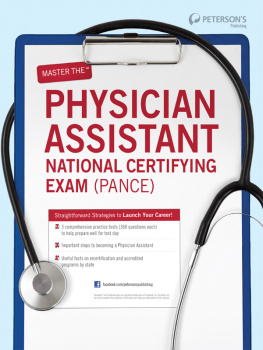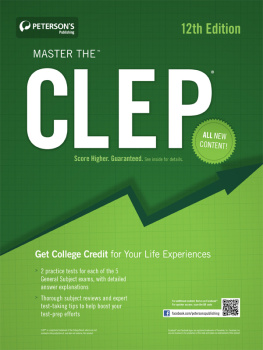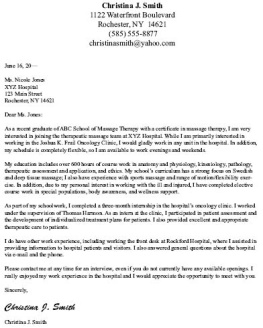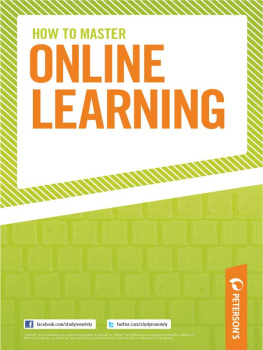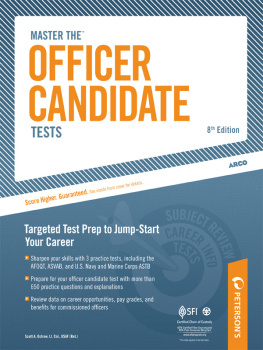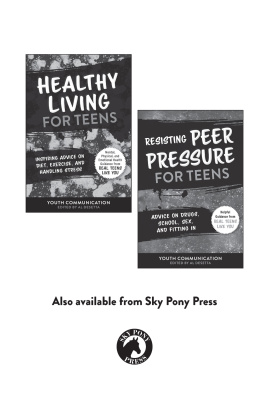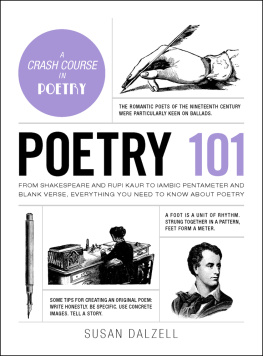Dont Break the Bank:
College Edition

About Petersons
Petersons provides the accurate, dependable, high-quality education content and guidance you need to succeed. No matter where you are on your academic or professional path, you can rely on Petersons print and digital publications for the most up-to-date education exploration data, expert test-prep tools, and top-notch career success resourceseverything you need to achieve your goals.
For more information, contact Petersons, 3 Columbia Circle, Suite 205, Albany, NY 12203-5158;
800-338-3282 Ext. 54229; or find us online at www.petersonsbooks.com .
2013 Petersons, a Nelnet company
Petersons Publishing makes every reasonable effort to obtain accurate, complete, and timely data from reliable sources. Nevertheless, Petersons and the third-party data suppliers make no representation or warranty, either expressed or implied, as to the accuracy, timeliness, or completeness of the data or the results to be obtained from using the data, including, but not limited to, its quality, performance, merchantability, or fitness for a particular purpose, non-infringement or otherwise.
Neither Petersons Publishing nor the third-party data suppliers warrant, guarantee, or make any representations that the results from using the data will be successful or will satisfy users requirements. The entire risk to the results and performance is assumed by the user.
ALL RIGHTS RESERVED. No part of this work covered by the copyright herein may be reproduced or used in any form or by any meansgraphic, electronic, or mechanical, including photocopying, recording, taping, Web distribution, or information storage and retrieval systemswithout the prior written permission of the publisher.
For permission to use material from this text or product, complete the Permission Request Form at http://www.petersonspublishing.com/spa/permissions.aspx .
ISBN-13: 978-0-7689-3812-8
First Edition
A Letter to Students
Dear Reader:
Many people have a love-hate relationship with money. They do not like dealing with it, worrying about it, and working at jobs they may not love in order to earn it. But they also realize that money is sort of a necessary evil. From a practical standpoint, we all know that it is impossible to survive without it.
Of course, money itself isnt necessarily bad. Its just that people often display bad behavior in order to get money and then may have bad habits related to spending it.
But if you educate yourself about the responsible ways to handle money, and exercise self-control when it comes to spending it, money can be a good thing. It is what you will use to support yourself and your family, to buy things you need (and, if budget allows, things you want), and also to pay for things like education, travel, family vacations, and other experiences you will enjoy.
Of course, first you have to learn important things about moneysuch as how to earn it, smart strategies for spending it wisely, and the best ways to invest it.
Learning about money is very important at this stage of your life because, most likely, you are starting to gain some financial independence and handle your own money as an adult. You have college tuition bills and other expenses, and you may have a job or two in order to pay your bills. Its important that you have the tools to help you understand how to handle money wisely so that you can pay your bills and manage your moneywithout getting into financial trouble.
This book will help you become financially savvy by explaining
important aspects related to earning money
tips for stretching it and sticking to a budget
the pros and cons of credit
advice for saving for your future
And much more!
We hope you will find this publication useful in helping you increase your financial know-how. Petersons publishes a full line of booksfinancial aid, career preparation, test prep, and education exploration.
Other Petersons books you may find helpful include the following:
Best Scholarships for the Best Students
The C Students Guide to Scholarships
How to Get Money for College
Scholarships, Grants & Prizes
Petersons publications can be found at high school guidance offices, college libraries and career centers, and your local bookstore and library. Petersons books are now also available as eBooks and online at www.petersonsbooks.com.
We welcome any comments or suggestions you may have about this publication. Your feedback will help us make educational and financial dreams possible for youand others like you.
Sincerely,
Petersons Editorial Staff
Table of Contents
Chapter One:
Money Basics
BANKING
By this point in your life, its likely that you already have a checking and/or savings account and probably have lots of experience with money and financial transactionsincluding shopping online and buying things at a store using methods other than cash. However, were willing to guess that you havent given much thought to what goes on behind the scenes and how the whole process actually works. And you may not know much about the banking system and what happens to allow you to use that debit card or write out that check.
In some ways, banking is much easier now than it was in the past. In many cases, you can handle a lot of your money-related tasks from home or wherever you happen to be, without ever going near an actual bank.
In other ways, though, the process is a lot more complicated, partly because you have so many more options. There are a lot of special types of savings and checking accountsand many ways to access those accounts, including online, by phone or using a smartphone or other device.
Well discuss some of the various systems involved with the banking process and delve into some specific banking-related topics, and we think youll discover some interesting things you didnt knowand possibly learn a few tips that might make your financial life a bit easier.
The FDIC Is Your Friend
The important thing to know about the FDIC is that it protects banking customers against loss should something strange or unexpected happen to a bank. Heres a brief explanation of the FDIC from their website at ( http://www.fdic.gov ) .

The FDICthats short for Federal Deposit Insurance Corporationis part of the U.S. government. Congress created the FDIC in 1933 after a terrible economic period called The Great Depression when thousands of banks shut down and families and businesses all across America lost money they had deposited in those banks. The FDICs primary job is to make sure that, if a bank closes, all of the banks customers will get their deposits backincluding any interest theyve earnedup to the insurance limit under federal law. In the eighty years since the start of the FDIC, we have responded to about 3,000 bank failures, and we are proud to say that no depositor has lost a single penny of insured money.
SAVINGS ACCOUNTS
Traditionally, most peoples first experience with the banking system was in the form of a savings account. In the past, when you opened a savings account, you would get a little book that looked similar to a passport where the tellers would write or type entries about your deposits, withdrawals, and other financial transactions.
These days, you access your account information online, and you will likely just receive an ATM card, which you will use to access your money and get account information.


